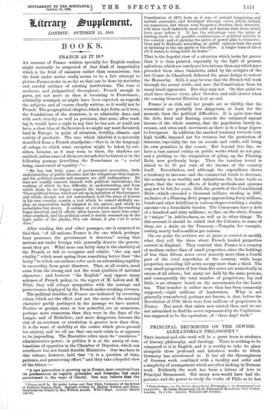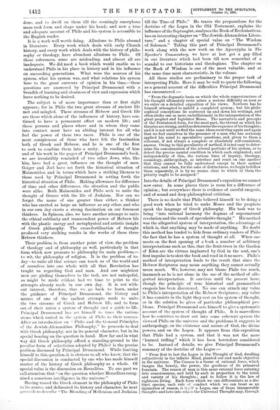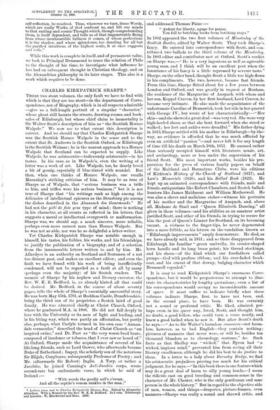PRINCIPAL DRUMMOND ON THE JEWISH- ALEXANDRIAN PHILOSOPHY.*
Tam learned and able work will be a great boon to students of history, philosophy, and theology. There is nothing to be compared to it in English, and it is worthy to take its place alongside those profound and laborious works to which Germany has accustomed us. It has all the thoroughness of German work, combined with a lucidity and order and a simplicity of arrangement which are often lacking in German work. Evidently the work has been a labour of love to Principal Drummond. Not many men would have had the patience and the power to study the works of Philo as he has
• PliiieJteckens ; or, the Jeseish-Alevandrian Philosophy in its Development and Completion. By James Drummond, LL.D., Principal of Manchester New College, London. In 2 vols. Loudon: Williams and Norgate.
done, and to dwell on them till the seemingly amorphous mass took form and shape under his hand; and now a true and adequate account of Philo and his system is accessible to the English reader.
It is a work well worth doing. Allusions to Philo abound in literature. Every work which deals with early Church history, and every work which deals with the history of philo- sophy or theology, have abundant allusions to Philo. Of these references, some are misleading, and almost all are inadequate. We did need a book which would enable us to understand Philo in his place in history and in his influence on succeeding generations. What were the sources of his system, what his system was, and what relations his system bore to the great currents of opinion in his time,—these questions are answered by Principal Drummond with a breadth of learning and clearness of view and expression which leave nothing to be desired.
The subject is of more importance than at first sight appears ; for in Philo the two great streams of ancient life met and mingled. These streams of Hebrew and Greek life are those which alone of the influences of history, have con- tinued to have a permanent effect on modern life ; and those persons and places where and in whom they came into contact must have an abiding interest for all who feel the power of these two races. Philo is one of the most conspicuous of those who have felt the fascination both of Greek and Hebrew, and he is one of the first to seek to combine them into a unity. In reading of him and of his work in the pages of Principal Drummond's book, we are irresistibly reminded of two other Jews, who, like him, have had a great influence on the thought of man. Geiger and Joel have set forth the historical situation of Maimonides, and in terms which have a striking likeness to those used by Principal Drummond in setting forth the historical situation of Philo. Making allowance for difference of time and other differences, the situation and the public were alike. Both 3itaimonides and Philo seek to unite the thought of Greece with the life of Judaism. Nor can we forget the name of one greater than either, a thinker who has exerted as large an influence as any other, and who in our own day exerts a strong fascination on our foremost thinkers. In Spinoza, also, we have another attempt to unite the ethical sublimity and transcendent power of Hebrew life with the plastic energy and metaphysical and artistic insight of Greek philosophy. The cross-fertilisation of thought produced very striking results in the works of these three Hebrew thinkers.
Their problem is, from another point of view, the problem of theology and of philosophy as well, particularly in that form which now presents to philosophy its main problem,— to wit, the philosophy of religion. It is the problem of to- day—to unite all that science can teach us of the world and of ourselves into one whole with all that Revelation has taught us regarding God and man. And our mightiest men arc girding themselves to the task, are not unhopeful, as might be made evident had we time to point to the attempts already made in our own day. It is not with- out interest, therefore, that we go back to learn, under the guidance of Principal Drummond, the history and nature of one of the earliest attempts made to unite the two streams of Greek and Hebrew life, and to form out of their union a system of thought and a guide to life.
Principal Drummond has set himself to trace the various stems which united in the system of Philo to their sources.
After an introduction on " Philo and the General Principles of the Jewish-Alexandrian Philosophy," he proceeds to deal with Greek philosophy, not in its general character, but in its special bearing on the question in hand. How far and in what way did Greek philosophy afford a standing-ground to the peculiar form of eclecticism adopted by Philo? is the precise problem discussed by Principal Drummond. While limiting himself to this question, it is obvious to all who know, that the special discussion is conducted by one who has made himself master of the history of Greek philosophy as a whole. Of special value is the discussion on Heraclitus. To one part we call attention, that "on the question whether Heraclitus recog- nised a conscious intelligence in the universe."
Having traced the Greek element in the philosophy of Philo to its source, and delineated its history and character, he next proPoeds to describe "The Blending of Hellenism and Judaism
till the Time of Philo." He traces the preparations for the doctrine of the Logos in the Old Testament, explains the influence of the Septuagint, analyses the Book of Ecclesiasticus, has on interesting chapter on "The Jewish-Alexandrian Litera- ture," and a chapter of special value on "The Wisdom of Solomon." Taking this part of Principal Drummond's work along with the new work on the Apocrypha in The
Speaker's Convm,entary, we have at last got a gap filled in our literature which had been till now somewhat of a scandal to our historians and theologians. The chapter on the Book of Wisdom is one of the most valuable, and at the same time most characteristic, in the volume.
All these studies are preliminary to the proper task of interpreting Philo. Here it may be well to quote the following as a general account of the difficulties Principal Drummond has encountered :—
"Prom the dogmatic basis on which the whole superstructure of his thought ultimately rests arises a serious difficulty as soon as we enter on a detailed exposition of his views. Nowhere has he himself attempted to unfold a completed system ; but his philo- sophical conceptions lie scattered up and down his writings, and often strike one as mere embellishment in the interpretation of the great prophet and legislator Moses. The narratives and precepts of the Pentateuch form, for the most part, the thread on which his theories are strung, and thus determine the sequence of his thoughts; and it is not until we find the same ideas recurring again and again that we feel ourselves in the presence of a man who has seriously applied his mind to speculative questions, and given to them a coherent, if not always a complete or absolutely self-consistent, answer. Owing to this peculiarity of method, it is not easy to deter- mine the concatenation of the several portions of his system, or to detect the precise mental condition in which each originated ; and independently of this, the various lines of inquiry, theology, cosmology, anthropology, so interlace and react on one another that they cannot be fully understood except in their mutual relations, and when, for the sake of distinctness, we begin to follow them separately, it is by no means clear to which of them the priority ought to be assigned."
Into the details of Principal Drummond's exposition we cannot now enter. In some places there is room for a difference of opinion ; but everywhere there is evidence of careful exegesis, and of sound and deep philosophical criticism.
There is no doubt that Philo believed himself to be doing a good work when he tried to make Moses and the prophets speak the language of Greek philosophy. His task was to bring "into rational harmony the dogmas of supernatural revelation and the result of speculatiire thought." His method was the allegorical system of interpretation, the advantage of which is, that anything may be made of anything. No doubt this method has tended to hide from ordinary readers of Philo the fact that he has a system of thought at all. When one meets on the first opening of a b3ok a number of arbitrary interpretations such as this, that the fruit-trees in the Garden of Eden are the virtues implanted by God in the soul, one's first impulse is to shut the book and read in it no more. Philo's method of interpretation leads to the result that since the Hebrew Scriptures may mean anything, they cannot actually mean much. We, however, may not blame Philo too much, inasmuch as he is not alone in the use of the method of alle- gorical interpretation. It survives until the present hour, though the principle of true historical and grammatical
exegesis has been discovered. No one can attach any value to Philo's interpretation of the Hebrew Scriptures; any value it has consists in the light they cast on his system of thought, or in the solution he gives of particular philosophical pro- blems. Principal Drummond sets himself to give a systematic account of the system of thought of Philo. It is marvellous how he contrives to draw out into some coherent system the views of Philo on the universe and the problems it suggests in anthropology, on the existence and nature of God, the divine powers, and on the Logos. It appears from this exposition that Philo had a system, and that it was not the mere "learned trifling" which it has been heretofore considered to be. Instead of details, we give Principal Drummond's summary of the doctrine of the Logos :— " From first to last the Logos is the Thought of God, dwelling subjectively in the infinite Mind, planted out and made objective in the universe. The Cosmos is a tissue of rational force, which images the beauty, the power, the goodness of its primteval fountain. The reason of man is this same rational force entering into consciousness, and held by each in proportion to the truth and variety of his thoughts ; and to follow it is the law of righteous living. Each form which we can differentiate as a dis- tinct species, each rule of conduct which we can treat as an injunction of reason, is itself a Logos, one of those innumerable thoughts and laws into which the Universal Thought may, through
self-reflection, be resolved. Thus, wherever we turn, these Words, which are really Works, of God confront us, and lift our minds to that uniting and cosmic Thought which, though comprehending them, is itself dependent, and tells us of that impenetrable Being from whose inexhaustible fullness it comes, of whose perfections it is the shadow, and whose splendours, too dazzling for all but the purified intuitions of the highest souls, it at once suggests and veils."
While this work is complete in itself, and of permanent value, we look to Principal Drummond to trace the relation of Philo to the thought of his time, to investigate what influence he has had on subsequent thought in Christian theology, and on the Alexandrian philosophy in its later stages. This also is a work which requires to be done.




















































 Previous page
Previous page